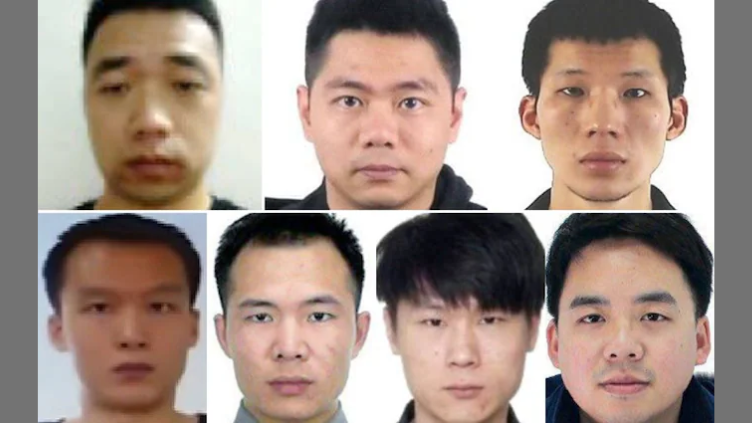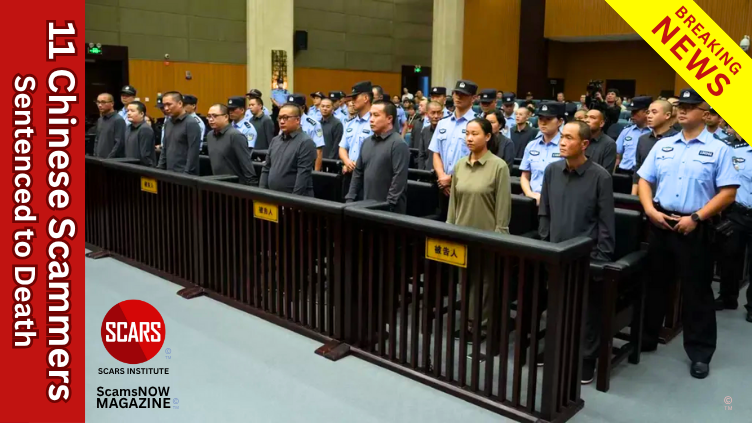7 Chinese Hackers Indicted In U.S. Court
Authors:
• SCARS Editorial Team – Society of Citizens Against Relationship Scams Inc.
• United States Department of Justice
About This Article
In a significant development, seven Chinese hackers, associated with the Chinese government and operating under the APT31 cybercrime and hacking group, have been indicted for their involvement in a sophisticated cybercrime scheme targeting perceived critics of China, U.S. businesses, and politicians.
The indictment, unsealed recently, charges the individuals with conspiracy to commit computer intrusions and wire fraud, highlighting their role in cyber espionage, economic espionage, and foreign intelligence activities.
These cybercriminals, including Ni Gaobin, Weng Ming, Cheng Feng, Peng Yaowen, Sun Xiaohui, Xiong Wang, and Zhao Guangzong, allegedly conducted global campaigns of hacking and cybercrime spanning over 14 years. Their activities targeted thousands of individuals and entities, compromising networks, email accounts, and cloud storage.
The indictment underscores the extensive reach of state-sponsored hacking operations and the need for heightened cybersecurity measures to counter such threats.

Seven Chinese Hackers associated with Chinese Government Charged with Computer Intrusions Targeting Perceived Critics of China and U.S. Businesses and Politicians
An indictment was unsealed today charging seven (Chinese Hackers) nationals of the People’s Republic of China (PRC) with conspiracy to commit computer intrusions and conspiracy to commit wire fraud for their involvement in a PRC-based hacking group that spent approximately 14 years targeting U.S. and foreign critics, businesses and political officials in furtherance of the PRC’s cybercrime, economic espionage, and foreign intelligence objectives.
♣ The cybercriminals defendants are Ni Gaobin (倪高彬), Weng Ming (翁明), Cheng Feng (程锋), Peng Yaowen (彭耀文), Sun Xiaohui (孙小辉), Xiong Wang (熊旺), and Zhao Guangzong (赵光宗).
Merrick B. Garland, United States Attorney General; Breon Peace, United States Attorney for the Eastern District of New York; Lisa O. Monaco, United States Deputy Attorney General; Matthew G. Olsen, Assistant Attorney General of the Justice Department’s National Security Division; James Smith, Assistant Director-in-Charge, Federal Bureau of Investigation, New York Field Office (FBI), and Robert W. “Wes” Wheeler, Jr., Special Agent-in-Charge, FBI, Chicago Field Office (FBI), announced the indictment.
“The Justice Department will not tolerate efforts by the Chinese government to intimidate Americans who serve the public, silence the dissidents who are protected by American laws, or steal from American businesses,” said Attorney General Merrick B. Garland. “This case serves as a reminder of the ends to which the Chinese government is willing to go to target and intimidate its critics, including launching malicious cyber operations aimed at threatening the national security of the United States and our allies.”
“These allegations pull back the curtain on China’s vast illegal hacking operation that targeted sensitive data from U.S. elected and government officials, journalists and academics; valuable information from American companies; and political dissidents in America and abroad. Their sinister scheme victimized thousands of people and entities across the world, and lasted for well over a decade,” stated U.S. Attorney Peace. “America’s sovereignty extends to its cyberspace. Today’s charges demonstrate my Office’s commitment to upholding and protecting that jurisdiction, and to putting an end to malicious nation state cyber activity.”
“Over 10,000 malicious emails, impacting thousands of victims, across multiple continents. As alleged in today’s indictment, this prolific global hacking operation – backed by the PRC government – targeted journalists, political officials, and companies to repress critics of the Chinese regime, compromise government institutions, and steal trade secrets,” said Deputy Attorney General Lisa Monaco. “The Department of Justice will relentlessly pursue, expose, and hold accountable cyber criminals who would undermine democracies and threaten our national security.”
“The indictment unsealed today, together with statements from our foreign partners regarding related activity, shed further light on the PRC Ministry of State Security’s aggressive cyber espionage and transnational repression activities worldwide,” said Assistant Attorney General Matthew G. Olsen of the Justice Department’s National Security Division. “Today’s announcements underscore the need to remain vigilant to cybersecurity threats and the potential for cyber-enabled foreign malign influence efforts, especially as we approach the 2024 election cycle. The Department of Justice will continue to leverage all tools to disrupt malicious cyber actors who threaten our national security and aim to repress fundamental freedoms worldwide.”
“These defendants were part of a Chinese government-sponsored hacking group, targeting U.S. businesses and U.S. political officials for intrusion for over a decade as part of a larger, malicious global campaign. These charges are yet another example of hostile actions taken by the PRC to attack not only American businesses and infrastructure, but the security of our nation. FBI New York is united with our partners – internationally, federally, and the private sector – to protect our common goals and ideals from antagonistic nation state actors,” stated FBI Assistant Director-in-Charge Smith.
“APT31 Group’s practices further demonstrate the size and scope of the PRC’s state-sponsored hacking apparatus,” said Robert W. “Wes” Wheeler, Jr., Special Agent-in-Charge of the Chicago Field Office of the FBI. “FBI Chicago worked tirelessly to uncover this complex web of alleged foreign intelligence and economic espionage crimes. Thanks to these efforts, as well as our partnerships with the U.S. Attorney’s Offices and fellow Field Offices, the FBI continues to be successful in holding groups accountable and protecting national security.”
Chinese Hackers Case Overview
As alleged in the indictment and court filings, the Chinese hackers defendants, along with dozens of identified PRC Ministry of State Security (MSS) intelligence officers, contractor Chinese hackers, and support personnel, were members of a hacking/cybercrime group operating in the PRC and known within the cyber security community as Advanced Persistent Threat 31 (the APT31 Group). The APT31 Group was part of a cyberespionage program run by the MSS’s Hubei State Security Department, located in the city of Wuhan. Through their involvement with the APT31 Group, since at least 2010, the defendants conducted global campaigns of computer hacking and cybercrime targeting political dissidents and perceived supporters located inside and outside of China, government and political officials, candidates and campaign personnel in the United States and elsewhere and American companies.
The Chinese hackers defendants and others in the APT31 Group targeted thousands of U.S. and foreign individuals and companies. Some of this cybercrime activity resulted in successful compromises of the targets’ networks, email accounts, cloud storage accounts, and telephone call records, with some surveillance of compromised email accounts lasting many years.
Chinese Hackers Scheme
The more than 10,000 malicious emails that the defendants and others in the APT31 Group sent to these targets often appeared to be from prominent news outlets or journalists and appeared to contain legitimate news articles. The malicious cybercrime emails contained hidden tracking links, such that if the recipient simply opened the email, information about the recipient, including the recipient’s location, internet protocol (IP) addresses, network schematics and specific devices used to access the pertinent email accounts, was transmitted to a server controlled by the defendants and those working with them. The defendants and others in the APT31 Group then used this information to enable more direct and sophisticated targeted hacking, such as compromising the recipients’ home routers and other electronic devices.
The defendants and others in the APT31 Group also sent malicious tracking-link emails to government officials across the world who expressed criticism of the PRC government. For example, in or about 2021, the Conspirators targeted the email accounts of various foreign government individuals world who were part of the Inter-Parliamentary Alliance on China (IPAC), a group founded in 2020 on the anniversary of the 1989 Tiananmen Square protests whose stated purpose was to counter the threats posed by the Chinese Communist Party to the international order and democratic principles. The targets included every European Union member of IPAC, and 43 United Kingdom parliamentary accounts, most of whom were members of IPAC or had been outspoken on topics relating to the PRC government.
To gain and maintain access to the victim’s computer networks, the defendants and others in the APT31 Group employed sophisticated hacking techniques including zero-day exploits, which are exploits that the hackers became aware of before the manufacturer or the victim were able to patch or fix the vulnerability. These activities resulted in the confirmed and potential compromise of economic plans, intellectual property, and trade secrets belonging to American businesses, and contributed to the estimated billions of dollars lost every year as a result of the PRC’s state-sponsored apparatus to transfer U.S. technology to the PRC.
Targeting of U.S. Government Officials and U.S. and Foreign Politicians and Campaigns
The targeted U.S. government officials included individuals working in the White House, at the Departments of Justice, Commerce, Treasury and State, and U.S. Senators and Representatives of both political parties. The defendants and others in the APT31 Group targeted these individuals at both professional and personal email addresses. Additionally, in some cases, the defendants also targeted victims’ spouses, including the spouses of a high-ranking Department of Justice official, high-ranking White House officials and multiple United States Senators. Targets also included election campaign staff from both major U.S. political parties in advance of the 2020 election.
The allegations in the indictment regarding the malicious cyber activity targeting political officials, candidates, and campaign personnel are consistent with the March 2021 Joint Report of the Department of Justice and the Department of Homeland Security on Foreign Interference Targeting Election Infrastructure or Political Organization, Campaign, or Candidate Infrastructure Related to the 2020 US Federal Elections. That report cited incidents when Chinese government-affiliated actors:
“materially impacted the security of networks associated with or pertaining to US political organizations, candidates, and campaigns during the 2020 federal elections.”
That report also concluded that “such actors gathered at least some information they could have released in influence operations,” but which the Chinese actors did not ultimately deploy in such a manner. Consistent with that conclusion, the indictment does not allege that the hacking furthered any Chinese government influence operations against the U.S. The indictment’s allegations nonetheless serve to underscore the need for U.S. and allied political organizations, candidates, and campaigns to remain vigilant in their cybersecurity posture and in otherwise protecting their sensitive information from foreign intelligence services, particularly in light of the U.S. Intelligence Community’s recent assessment that:
“[t]he PRC may attempt to influence the U.S. elections in 2024 at some level because of its desire to sideline critics of China and magnify U.S. societal divisions.”
Targeting of U.S. Companies
The defendants and others in the APT31 Group also targeted individuals and dozens of companies operating in areas of national economic importance, including the defense, information technology, telecommunications, manufacturing and trade, finance, consulting, legal and research industries. The defendants and others in the APT31 Group hacked and attempted to hack dozens of companies or entities operating in these industries, including multiple cleared defense contractors who provide products and services to the U.S. military, multiple managed service providers who managed the computer networks and security for other companies, a leading provider of 5G network equipment, and a leading global provider of wireless technology, among many others.
Targeting for Transnational Repression of Dissidents
The defendants and the APT31 Group also targeted individual dissidents around the world and other individuals who were perceived as supporting such dissidents. For example, in 2018, after several activists who spearheaded Hong Kong’s Umbrella Movement were nominated for the Nobel Peace Prize, the defendants and the APT31 Group targeted Norwegian government officials and a Norwegian managed service provider. The conspirators also successfully compromised Hong Kong pro-democracy activists and their associates located in Hong Kong, the United States, and other foreign locations with identical malware.
The charged defendants’ roles in the conspiracy consisted of testing and exploiting the malware used to conduct these intrusions, managing infrastructure associated with these intrusions, and conducting surveillance and intrusions against specific U.S. entities. For example, defendants Cheng Feng, Sun Xiaohui, Weng Ming, Xiong Wang and Zhao Guangzong were involved in testing and exploiting malware, including malware used in some of these intrusions. Cheng and Ni Gaobin managed infrastructure associated with some of these intrusions, including the domain name for a command-and-control server that accessed at least 59 unique victim computers, including a telecommunications company that was a leading provider of 5G network equipment in the United States, an Alabama-based research corporation in the aerospace and defense industries and a Maryland-based professional support services company. Sun and Weng operated the infrastructure used in an intrusion into a U.S. company known for its public opinion polls. Sun and Peng Yaowen conducted research and reconnaissance on several additional U.S. entities that were later the victims of the APT31 Group’s intrusion campaigns. Ni and Zhao sent emails with links to files containing malware to PRC dissidents, specifically Hong Kong legislators and democracy advocates, as well as targeting U.S. entities focusing on PRC-related issues.
The government’s case is being prosecuted by the Office’s National Security and Cybercrime Section. Assistant United States Attorneys Douglas M. Pravda, Saritha Komatireddy and Jessica Weigel are in charge of the prosecution, with assistance from Matthew Anzaldi and Matthew Chang of the National Security Division’s National Security Cyber Section and from the Office’s Litigation Analyst Mary Clare McMahon.
The Defendants:
- Ni Gaobin (倪高彬)
Age: 38
People’s Republic of China - Weng Ming (翁明)
Age: 37
People’s Republic of China - Cheng Feng (程锋)
Age: 34
People’s Republic of China - Peng Yaowen (彭耀文)
Age: 38
People’s Republic of China - Sun Xiaohui (孙小辉)
Age: 38
People’s Republic of China - Xiong Wang (熊旺)
Age: 35
People’s Republic of China - Zhao Guangzong (赵光宗)
Age: 38
People’s Republic of China
E.D.N.Y. Docket No. 24-CR-42 (RER)
-/ 30 /-
What do you think about this?
Please share your thoughts in a comment below!
-/ 30 /-
What do you think about this?
Please share your thoughts in a comment below!
SCARS LINKS: AgainstScams.org RomanceScamsNOW.com ContraEstafas.org ScammerPhotos.com Anyscam.com ScamsNOW.com
reporting.AgainstScams.org support.AgainstScams.org membership.AgainstScams.org donate.AgainstScams.org shop.AgainstScams.org
youtube.AgainstScams.org linkedin.AgainstScams.org facebook.AgainstScams.org
Important Information for New Scam Victims
- Please visit www.ScamVictimsSupport.org – a SCARS Website for New Scam Victims & Sextortion Victims.
- SCARS Institute now offers its free, safe, and private Scam Survivor’s Support Community at www.SCARScommunity.org – this is not on a social media platform, it is our own safe & secure platform created by the SCARS Institute especially for scam victims & survivors.
- SCARS Institute now offers a free recovery learning program at www.SCARSeducation.org.
- Please visit www.ScamPsychology.org – to more fully understand the psychological concepts involved in scams and scam victim recovery.
If you are looking for local trauma counselors, please visit counseling.AgainstScams.org
If you need to speak with someone now, you can dial 988 or find phone numbers for crisis hotlines all around the world here: www.opencounseling.com/suicide-hotlines
Statement About Victim Blaming
Some of our articles discuss various aspects of victims. This is both about better understanding victims (the science of victimology) and their behaviors and psychology. This helps us to educate victims/survivors about why these crimes happened and not to blame themselves, better develop recovery programs, and help victims avoid scams in the future. At times, this may sound like blaming the victim, but it does not blame scam victims; we are simply explaining the hows and whys of the experience victims have.
These articles, about the Psychology of Scams or Victim Psychology – meaning that all humans have psychological or cognitive characteristics in common that can either be exploited or work against us – help us all to understand the unique challenges victims face before, during, and after scams, fraud, or cybercrimes. These sometimes talk about some of the vulnerabilities the scammers exploit. Victims rarely have control of them or are even aware of them, until something like a scam happens, and then they can learn how their mind works and how to overcome these mechanisms.
Articles like these help victims and others understand these processes and how to help prevent them from being exploited again or to help them recover more easily by understanding their post-scam behaviors. Learn more about the Psychology of Scams at www.ScamPsychology.org
SCARS INSTITUTE RESOURCES:
If You Have Been Victimized By A Scam Or Cybercrime
♦ If you are a victim of scams, go to www.ScamVictimsSupport.org for real knowledge and help
♦ SCARS Institute now offers its free, safe, and private Scam Survivor’s Support Community at www.SCARScommunity.org/register – this is not on a social media platform, it is our own safe & secure platform created by the SCARS Institute especially for scam victims & survivors.
♦ Enroll in SCARS Scam Survivor’s School now at www.SCARSeducation.org
♦ To report criminals, visit https://reporting.AgainstScams.org – we will NEVER give your data to money recovery companies like some do!
♦ Follow us and find our podcasts, webinars, and helpful videos on YouTube: https://www.youtube.com/@RomancescamsNowcom
♦ Learn about the Psychology of Scams at www.ScamPsychology.org
♦ Dig deeper into the reality of scams, fraud, and cybercrime at www.ScamsNOW.com and www.RomanceScamsNOW.com
♦ Scam Survivor’s Stories: www.ScamSurvivorStories.org
♦ For Scam Victim Advocates visit www.ScamVictimsAdvocates.org
♦ See more scammer photos on www.ScammerPhotos.com
You can also find the SCARS Institute’s knowledge and information on Facebook, Instagram, X, LinkedIn, and TruthSocial
Psychology Disclaimer:
All articles about psychology and the human brain on this website are for information & education only
The information provided in this and other SCARS articles are intended for educational and self-help purposes only and should not be construed as a substitute for professional therapy or counseling.
Note about Mindfulness: Mindfulness practices have the potential to create psychological distress for some individuals. Please consult a mental health professional or experienced meditation instructor for guidance should you encounter difficulties.
While any self-help techniques outlined herein may be beneficial for scam victims seeking to recover from their experience and move towards recovery, it is important to consult with a qualified mental health professional before initiating any course of action. Each individual’s experience and needs are unique, and what works for one person may not be suitable for another.
Additionally, any approach may not be appropriate for individuals with certain pre-existing mental health conditions or trauma histories. It is advisable to seek guidance from a licensed therapist or counselor who can provide personalized support, guidance, and treatment tailored to your specific needs.
If you are experiencing significant distress or emotional difficulties related to a scam or other traumatic event, please consult your doctor or mental health provider for appropriate care and support.
Also read our SCARS Institute Statement about Professional Care for Scam Victims – click here
If you are in crisis, feeling desperate, or in despair, please call 988 or your local crisis hotline – international numbers here.
More ScamsNOW.com Articles
A Question of Trust
At the SCARS Institute, we invite you to do your own research on the topics we speak about and publish. Our team investigates the subject being discussed, especially when it comes to understanding the scam victims-survivors’ experience. You can do Google searches, but in many cases, you will have to wade through scientific papers and studies. However, remember that biases and perspectives matter and influence the outcome. Regardless, we encourage you to explore these topics as thoroughly as you can for your own awareness.















![NavyLogo@4x-81[1] 7 Chinese Hackers Indicted In U.S. Court For Cybercrime - 2024](https://scamsnow.com/wp-content/uploads/2025/04/NavyLogo@4x-811.png)









![scars-institute[1] 7 Chinese Hackers Indicted In U.S. Court For Cybercrime - 2024](https://scamsnow.com/wp-content/uploads/2025/04/scars-institute1.png)

![niprc1.png1_-150×1501-1[1] 7 Chinese Hackers Indicted In U.S. Court For Cybercrime - 2024](https://scamsnow.com/wp-content/uploads/2025/04/niprc1.png1_-150x1501-11.webp)